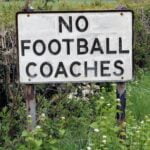Imagine this scenario. It’s the fourth quarter, less than a minute left, your football team is down 1 point, and your offense is on the field and on the verge of crossing the 50. The goal is to either score a Touchdown or kick a field goal and win the game.
 The players approach the huddle looking to the quarterback for instruction on what play they’ll be executing, only this time the quarterback has no answer.
The players approach the huddle looking to the quarterback for instruction on what play they’ll be executing, only this time the quarterback has no answer.
He explains to the group that the coaches have vacated the sideline and are no longer calling plays, so they’re now left to their own devices and the outcome of the game rests in their hands.
The Quarterback selects a play which he hopes will work and propel the team onto victory, and on this day, his decision making pays off and the team exits the field with a 2 point victory.
 The excited bunch head to the locker room, ready to celebrate, except when they arrive, their pride and enthusiasm are deflated when they realize that there are no coaches around to offer a post-game speech or distribute game balls to the team’s top performers.
The excited bunch head to the locker room, ready to celebrate, except when they arrive, their pride and enthusiasm are deflated when they realize that there are no coaches around to offer a post-game speech or distribute game balls to the team’s top performers.
They leave the stadium, and head home, trusting that the next day will be different. Except it isn’t.
They arrive at the practice facility expecting to get treatments and go over game tape but once again the coaches are absent. This leaves the players upset, confused, and frustrated. Although they are talented and enjoy some independence, they also want to improve and receive guidance from their coaches.
 Hoping to get a sense of what’s going on, the quarterback seeks out the owner. When he explains how the group is frustrated because they’re receiving no coaching, the owner replies “Relax. All that matters is that we make money. Winning and losing is not important”.
Hoping to get a sense of what’s going on, the quarterback seeks out the owner. When he explains how the group is frustrated because they’re receiving no coaching, the owner replies “Relax. All that matters is that we make money. Winning and losing is not important”.
The quarterback leaves the owner’s office, returns to his locker, and tries to process what he’s been told. If the only thing that matters is selling tickets, advertising, and broadcasting rights, then why does it matter who’s on the field, if they make plays, and who wins the contest?
This example may be farfetched for the National Football League, but it’s unfortunately a reality inside a number of radio stations today.
 I was raised in this business with the understanding that the ratings are your report card. The grade you receive from the audience tells you whether or not your product is successful. A higher number means more interest from advertisers and the more they spend, the easier it becomes to distribute raises to employees for a job well done.
I was raised in this business with the understanding that the ratings are your report card. The grade you receive from the audience tells you whether or not your product is successful. A higher number means more interest from advertisers and the more they spend, the easier it becomes to distribute raises to employees for a job well done.
While there are brands that care deeply about the performance of their radio stations, there are many others that measure success by the revenue generated by their sales teams. Although I agree that sales are vital, I also believe that results should be delivered on the programming end too.
 The audience is not privy to your business plan, nor do they care what you make or lose each year or if your stock price has risen or declined. They simply want to tune in, hear a local host discuss the teams and topics they care most about, and gain something from the content to share with their friends and family. The more unique content experiences you provide, the more tune-ins you’ll receive.
The audience is not privy to your business plan, nor do they care what you make or lose each year or if your stock price has risen or declined. They simply want to tune in, hear a local host discuss the teams and topics they care most about, and gain something from the content to share with their friends and family. The more unique content experiences you provide, the more tune-ins you’ll receive.
But how exactly do you produce unique on-air content experiences? Is it solely the responsibility of the on-air talent? Does a producer have skin in the game? What about the Program Director’s involvement?
The answer in my opinion is that it’s a shared responsibility. More times than not it’s going to start with having an inquisitive talent on the air who is masterful with the english language and has a brain that allows them to consider possibilities that are uncommon to the rest of us. That’s part of being a special talent.
 But even the best thinkers and content creators experience brain freeze and need to be coached, challenged, and given tips on how to improve.
But even the best thinkers and content creators experience brain freeze and need to be coached, challenged, and given tips on how to improve.
If you watch baseball, you probably know the names Mike Trout and Bryce Harper. They’re incredible players who have each won an MVP Award and they’re also both under 25 years of age. As great as they are, they still need to be coached.
Do you think just because they have talent that they have it all figured out and won’t ever fail?
 There’s a lot left in their respective careers and there are many obstacles they’ve yet to face. Regardless of how naturally skilled they may be, they each will need the benefit of great guidance to help them reach their full potential.
There’s a lot left in their respective careers and there are many obstacles they’ve yet to face. Regardless of how naturally skilled they may be, they each will need the benefit of great guidance to help them reach their full potential.
When a new pitcher comes up and has a certain strategy for attacking the zone, do you think that information might be helpful to them before they enter the batter’s box? Sure, maybe they’ll get lucky and connect on the first pitch and hit a homerun, but great players seek every advantage they can get to be successful and they rely on their coaches to help them.
What happens when they each sign larger contracts in the future and become Major League Baseball’s highest paid athletes, generating over 500 million dollars apiece? Do you think they won’t deal with different pressures, expectations, larger challenges off the field, and jealousy from inside their own clubhouses? When that happens, don’t you think they’ll want coaches they can trust to help them through some of their uncomfortable moments?
 Now think about that from a radio standpoint. There are some operators who assume just because an individual possesses talent, and receives a big paycheck that they don’t need coaching. The feeling becomes “He/She knows what they’re doing so leave them alone”. When that happens, many stop learning, and begin to treat their show as a responsibility instead of a labor of love.
Now think about that from a radio standpoint. There are some operators who assume just because an individual possesses talent, and receives a big paycheck that they don’t need coaching. The feeling becomes “He/She knows what they’re doing so leave them alone”. When that happens, many stop learning, and begin to treat their show as a responsibility instead of a labor of love.
I understand that it is a business, so if a company wants to adopt that approach and leave the talent in the middle of the ocean to swim to shore without a life preserver, that’s certainly their right. But I believe that you get the most out of people when you show them you care about the work they’re doing and invest time in gauging how they feel about the show, offering ideas to make it feel and sound better, and addressing any issues or concerns that are creating tension. It tells them that you’re paying attention and care about their progress.
 Each week I receive dozens of emails from people across this country seeking my coaching. I’m grateful that they think enough of me to want my feedback and it impresses me to see individuals seeking outside help to try and get better. That commitment to self improvement is what helps good performers become great. Every radio company should want people like that working for them because when people possess talent and treat their craft seriously, it pushes those they work with to be their best.
Each week I receive dozens of emails from people across this country seeking my coaching. I’m grateful that they think enough of me to want my feedback and it impresses me to see individuals seeking outside help to try and get better. That commitment to self improvement is what helps good performers become great. Every radio company should want people like that working for them because when people possess talent and treat their craft seriously, it pushes those they work with to be their best.
As excited as I am to see many striving to get getter, I’m equally saddened by the reminder of how many radio stations invest little to no time in their most important asset – their people.
 I realize that the business has become difficult for programmers. Many corporate executives and station managers are disconnected from the product and don’t understand how the meal gets made, who’s involved in making it, or why the customer is eating it. They simply look at the total amount of meals made, what it cost, how many were sold, and what type of profit they generated from it.
I realize that the business has become difficult for programmers. Many corporate executives and station managers are disconnected from the product and don’t understand how the meal gets made, who’s involved in making it, or why the customer is eating it. They simply look at the total amount of meals made, what it cost, how many were sold, and what type of profit they generated from it.
That’s business, and business does come first. But unlike music stations which have the benefit of relying on the music created by artists to fill their airwaves, sports talkers only go as far as their on-air talent can take them. If the talent is left to roam through the desert without a compass, it’s only a matter of time until you’re sending in the search party to find them. The great ones will find their way, but even those who aren’t great right now, may have the ability to reach that level in the future, but without coaching you’re limiting their potential to grow.
When I landed my first Program Director job in Poughkeepsie, NY I had no idea what I was doing. I had passion, a good work ethic, and my co-workers responded well to my lead. I had no idea though what content made the most sense to focus on, what separated a good promo from a bad promo, how the station could increase its ratings, or why an on-air talent should or shouldn’t take calls or conduct interviews. There was no book, seminar or mentor available to teach me how to become a good programmer. I was just thrust into the position and had to learn on the job.
 But that was Poughkeepsie, NY. In most smaller markets where budgets don’t exist, that’s to be expected. Why it’s set up that way though in some top 20 markets is frightening.
But that was Poughkeepsie, NY. In most smaller markets where budgets don’t exist, that’s to be expected. Why it’s set up that way though in some top 20 markets is frightening.
I know some programmers today who are running three or four radio stations inside one building, and also have roles either in production or on a talk show. There is even a situation where one sports station is led by a music station programmer who has a strong disdain for sports talk and tells the staff that he wants no involvement with them.
When I hear of these situations it’s very concerning. We can blame the individuals for a bad attitude and not getting enough out of the staff, but the bigger question is, how did these positions get created in the first place?
Maybe someone accepted the position because it included a raise. Or they were pressured into it by their company. If employers though believe an individual is going to make people better, maximize the radio station’s potential, and do good work when they’re spread that thin and running formats they dislike, they’re kidding themselves. A few may skate by for a while but eventually the results suffer and people leave.
 I had a conversation last week with someone I previously worked with who’s on a station that is getting soundly beaten in their local market by the competition. When I asked him what he was doing to reverse the latest trends and make a bigger impact with the audience, he told me that the ratings performance didn’t matter in his building, only the station’s revenue. When I asked him “how do you factor into that if you don’t deliver numbers or sell advertising for the company” he said “I just go to and from work, do my show and let the sales people worry about it”.
I had a conversation last week with someone I previously worked with who’s on a station that is getting soundly beaten in their local market by the competition. When I asked him what he was doing to reverse the latest trends and make a bigger impact with the audience, he told me that the ratings performance didn’t matter in his building, only the station’s revenue. When I asked him “how do you factor into that if you don’t deliver numbers or sell advertising for the company” he said “I just go to and from work, do my show and let the sales people worry about it”.
That answer bothered me because if you work in programming in this industry, the reason you do it is because you’re creative, passionate, love sports, enjoy competition, and want to be a success. The better you perform, the more money you make, the more popular you become, and the more successful you feel.
You also value the audience and have pride in your work, and care about the product you’re delivering. When you decided to pursue a career in this business, you didn’t do it because you wanted to fill air time and be seen as someone who was in a chair to sell sponsor messages. You pursued being a host because you felt you had something to say, you enjoyed connecting with people, and you felt your knowledge and presentation could help a company command a larger audience which in turn would help them generate revenue.
If the only thing defining your success now is whether Johnny or Suzy in sales sell spots inside of your show and meet their sales budget, then why are you even necessary? If it’s only about the advertising revenue, shouldn’t Johnny or Suzy host the show? I bet they’d increase their sales if they also had the air time to go with their selling skills.
If you’re not a host but are responsible for managing the radio station, and you’re not making time to coach your people and grow the radio station’s ratings, why aren’t you? Your title says “Program Director” not “Sales Assistant”, “Corporate Associate”, or “Budget Administrator”. I understand that the position is demanding and every department wants your time, but sometimes you have to say no.
 There is nothing more important to your future success and maintaining your position then the way you connect with your people. If they don’t get your input and their perception of you is that you’re uninterested in the product and their personal growth, they will eventually leave. When a brand’s best people depart, the performance declines, and when that happens, don’t be surprised if you’re the next one the company is calling on to vacate the premises.
There is nothing more important to your future success and maintaining your position then the way you connect with your people. If they don’t get your input and their perception of you is that you’re uninterested in the product and their personal growth, they will eventually leave. When a brand’s best people depart, the performance declines, and when that happens, don’t be surprised if you’re the next one the company is calling on to vacate the premises.
Talent has to matter and factor into every sports radio station’s strategy and success. No brand wins without great on-air personalities and they don’t reach their full potential without regular coaching from experienced leaders who understand how to help them win. Why that’s not considered important in some buildings is beyond my level of comprehension. You’d think that with competition increasing in the audio space today that there’d be an even larger focus placed on securing great leaders who can guide a brand to bigger results. Unfortunately though that’s not the case in each location.
When I hear a brand state that only sales matter, it’s usually because their programming isn’t generating big numbers. There’s nothing wrong with wanting to make money. Believe me, I want to win the revenue game too, and feed my family lobster instead of ramen noodles. But programming is the lifeblood of the sports radio format and if it’s not great, and not consistently worked on, then you become non-essential to the audience. Without an audience, your business is on life support.
 The goal in every organization should be to maximize the talent’s skills, show them the strengths and weaknesses in their show, and point out where the opportunities exist in the market to enjoy larger success. You do that by holding regular conversations, critiquing content, pointing out trends in the ratings, and explaining why they should do more or less of something during the show.
The goal in every organization should be to maximize the talent’s skills, show them the strengths and weaknesses in their show, and point out where the opportunities exist in the market to enjoy larger success. You do that by holding regular conversations, critiquing content, pointing out trends in the ratings, and explaining why they should do more or less of something during the show.
At first, many personalities will resist the feedback because they’re prideful and insecure and hate being judged. But when they walk away and think about what you said, they’ll appreciate it, respect it, and look to improve because every great performer wants to earn the trust, respect and support of the person they work for.
Some companies value coaching and the impact it has on their people. Others do not. Neither is right or wrong but a strong performance benefits every single company and individual. You can focus on helping your company make money, and that may be the ultimate measure of your brand’s success, but if you really want to laugh all the way to the bank, do yourself a favor and invest some time in your talent. After all, they’ll be the ones most responsible for your audience listening, your advertisers calling, and your sales budget being exceeded.

Jason Barrett is the Founder and CEO of Barrett Media. The company launched in September 2015 and has provided consulting services to America’s top audio and video brands, while simultaneously covering the media industry at BarrettMedia.com, becoming a daily destination for media professionals. Prior to Barrett Media, Jason built and programmed 95.7 The Game in San Francisco, and 101 ESPN in St. Louis. He was also the first sports programmer for SportsTalk 950 in Philadelphia, which later became 97.5 The Fanatic. Barrett also led 590 The Fan KFNS in St. Louis, and ESPN 1340/1390 in Poughkeepsie, NY, and worked on-air and behind the scenes at 101.5 WPDH, WTBQ 1110AM, and WPYX 106.5. He also spent two years at ESPN Radio in Bristol, CT producing ‘The Dan Patrick Show’ and ‘GameNight’. JB can be reached on Twitter @SportsRadioPD or by email at Jason@BarrettMedia.com.





